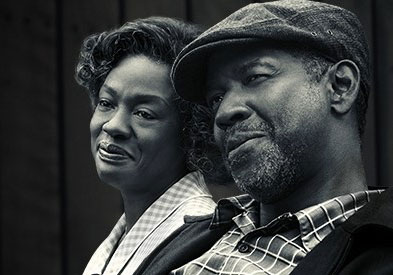Film Review: “Fences”
January 5, 2017
When you go to see “Fences” (and I urge you to go), don’t expect to see a movie. Expect a play on the big screen, like Fathom Events or the Metropolitan Opera’s Live in HD broadcasts in movie theaters.
Playwright August Wilson’s work is profound and, when his writing is coupled with the actors’ close-ups, depths of character are on display. Still, it takes a bit getting used to. The dialogue is poetic — musical and rhythmic with ideas and images that crackle and pop — but we’re just not accustomed to this much dialogue in movies these days. It’s a true “talkie.” For all that, director/actor Denzel Washington wisely kept “Fences” a play-on-film. How else could he be true to the character he plays with such bravado: the extroverted, extremely chatty Troy? Denzel insists we experience Troy as Wilson conceived him — larger-than-life, a grandstander who dances around his angst, hurt and despair to the tune of ATTENTION MUST BE PAID!
Yes, writer and director could have made this a more cinematic experience. And that would have been wonderful, too. But, why deprive us of this language and the reality of characters who speak their way through life the way most of us do?
In more than a few ways, “Fences” is an African-American “Death of a Salesman” although it’s not quite as tragic. Its pathos is not as draining but it is deeply moving. I think it’s because Troy is more likeable than Willy Loman (the central character of “Salesman”), and, as an African-American in 1950s and 1960s America, he is more complicated. Troy has more phantoms, more layers of social oppression to navigate than Loman and August Wilson surrounds him with a set of less deflated, more earth-centered family and friends.
Troy’s devoted wife, Rose, has fire in her belly (Viola Davis – WOW!) and her decision to love (yes, friends, love is ultimately a “decision”) brings rays of light into the proceedings.
Also: Troy’s son, Cory (played by Jovan Adepo, a natural) has more going for him than Willy Loman’s sons. The primary reason for that is Loman and sons lived in a fantasy world of Willie’s own making — his version of “The American Dream”; his misguided definition of “success.” In contrast, Troy, the patriarch of Wilson’s drama, has taken a very hard look at America and all the prejudices and limitations it imposes on African-American life. It is his blessing and his curse, his wisdom and his folly. His tragedy is that he transmits his pain, intentionally and unintentionally, on his wife and son without ever transcending it. Is it because he cannot, or will not, aspire to reclaim a different, richer dignity? The answer is YES to both. Which is why Rose reaches a nobility her husband can only covet.
And that is sad, indeed, for unlike so many fathers who abandon their wives, girlfriends and children in search of some other kind of manhood, Troy takes responsibility for his family, extended family and friends. His tragedy is that he is not fully present to the life he leads. Instead he indulges an undercurrent of resentment, chasing phantoms of release rather than being at ease in the stillness of sacred silence.
But we cannot judge him. He had had a moment of being on the cusp of greatness — a major league baseball career. If not for social bias toward race, age and its obsession with youth (yes, even THEN), he could have been a contender. And he, and we, live in a culture that values little else. God help us.
The power of “Fences” — its situation and ideas, the faces of its characters — lingers profoundly long after watching it. I guarantee your appreciation for the film will grow in the days and weeks ahead just as it has in the world’s response to Arthur Miller’s “Death of a Salesman” and Lorraine Hansberry’s “A Raisin in the Sun” with which this film has a strong affinity.
“Fences” is alive with exciting performances of flawed but fascinating people who convey many truths about the nature of marriage, parenting, family and friendship.
I hope you will treat yourself to experience some of the depth of drive and feeling “Fences” evokes — feelings we too often sublimate or eschew. Your investment in this film will offer you and your loved ones a great deal to talk about.
Paulist Fr. James DiLuzio is a member of our preaching apostolate, leading parish missions and retreats across the United States. He is the creator of “Luke Live.”
